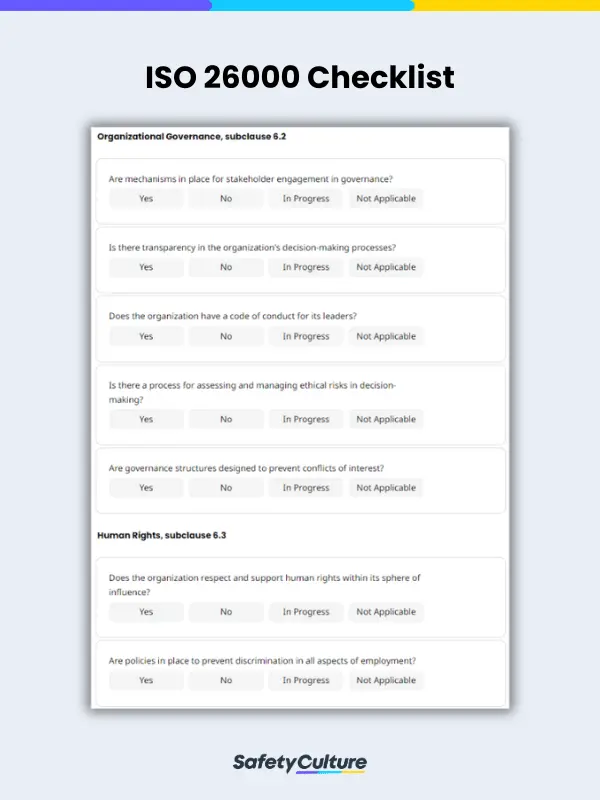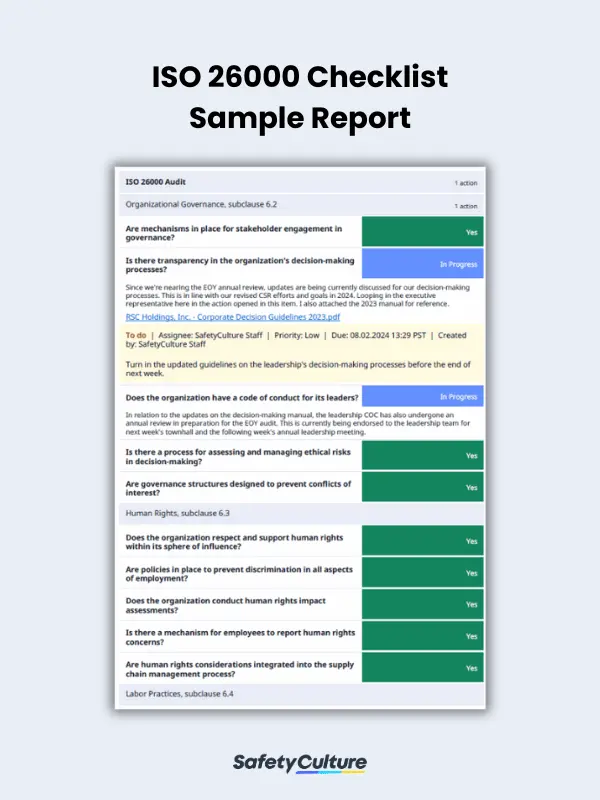What is an ISO 26000 Checklist?
An ISO 26000 checklist is a structured tool used to assess and evaluate an organization’s adherence to the principles and guidelines outlined in the ISO 26000 standard created by the International Organization for Standardization (ISO). This checklist typically includes a series of questions or criteria derived from the standard used by organizations to systematically review their social responsibility practices across various areas. These include governance, human rights, labor practices, the environment, fair operating practices, consumer issues, and community involvement.
Why Use a Checklist for Auditing ISO 26000 Conformance
The ISO 26000 standard guides organizations on how they can sustain operational frameworks and practices in line with the United Nations’ Sustainable Development Goals (SDGs). In particular, it aids in supply chain sustainability by encouraging organizations to integrate social responsibility into their core practices. It emphasizes ethical practices, guiding organizations to address issues like human rights, fair labor practices, and corruption. By adopting ISO 26000, businesses can systematically enhance their commitment to social responsibility throughout the supply chain, fostering sustainability and ethical conduct.
Structured Self-Assessment
Conducting an audit for ISO 26000 conformance is a complex task, given the broad scope of social responsibility areas covered by it. Checklists serve as helpful tools for conducting self-audits of their conformance with this standard. Since it’s a voluntary guidance standard with no certification, the checklist serves as a self-assessment tool for organizations committed to improving their social responsibility performance.
By going through an ISO 26000 checklist, organizations can identify strengths, weaknesses, and areas for improvement in their CSR initiatives. It helps them ensure that their operations will lead to enhanced sustainability and positive contributions to society.
Systematic and Thorough Evaluation
By breaking down the standard into specific criteria, auditors can methodically assess each area of social responsibility, from governance to community involvement. This approach ensures a thorough examination, leaving no critical aspect overlooked during the audit process.
Consistency and Objectivity Across Audits
Checklists promote audit consistency, whether conducted by the same auditor over time or by different auditors within an organization. The standardized criteria provided by the checklist also reduce the risk of subjective judgments and help maintain the integrity and reliability of audit results across various evaluations.
What to Include in an ISO 26000 Checklist
In creating a comprehensive ISO 26000 checklist, organizations must carefully consider the key elements that align with the diverse principles and practices outlined in the ISO standard. By understanding what to include in an ISO 26000 checklist, organizations can systematically evaluate their practices, identify areas for improvement, and align their operations with the globally recognized principles of social responsibility.
Hence, make sure to include the following core areas in the checklist during ISO 26000 audits:
- Subclause 6.2 — Organizational Governance
- Subclause 6.3 — Human Rights
- Subclause 6.4 — Labor Practices
- Subclause 6.5 — Environment
- Subclause 6.6 — Fair Operating Practices
- Subclause 6.7 — Consumer Issues
- Subclause 6.8 — Community Involvement and Development
Also, don’t forget to include a title page and completion page to add further information about your organization and the audit being conducted.
How to Conduct an ISO 26000 Audit Using a Checklist
Conducting an ISO 26000 audit with the aid of a comprehensive checklist is a key process for organizations aspiring to uphold social responsibility standards. Follow this step-by-step guide as you carefully assess each aspect of your organization’s ISO 26000 conformance:
1. Plan the audit process.
Initiate the audit process by defining the scope and objectives. Make sure to clearly outline the criteria and subjects within the ISO 26000 standard that will be assessed. Based on these, make a plan that includes timelines, resources, and the choice of qualified auditors.
2. Customize the checklist to an organizational context.
Tailor the ISO 26000 checklist to align with the organization’s unique context, industry specifics, and social responsibility goals. Ensure that it includes the 7 core subjects of the standard to enhance its relevance and facilitate a more accurate evaluation of the organization’s practices.
3. Train auditors on checklist application.
Invest in training for auditors to familiarize them with the checklist’s application. Ensure that they understand the specific criteria and the documentation required during the audit. This way, well-trained auditors contribute to the consistency and objectivity in the evaluation process toward the overall effectiveness of the audit.
4. Systematically conduct the audit.
Evaluate each aspect or subject thoroughly, engage with relevant stakeholders, and gather evidence to support audit findings. The audit’s systematic execution ensures that all aspects of social responsibility are addressed, providing a holistic view of the organization’s performance.
5. Document findings and implement improvements.
Communicate conformance and non-conformance results to the organization’s leadership and stakeholders. Make sure to work with relevant teams on developing corrective action plans, utilizing the checklist as a guide for implementing improvements and aligning the organization more closely with ISO 26000 principles.
ISO 26000 Checklist Example
Check out this sample checklist to gain insights into the structured evaluation of various aspects of social responsibility, facilitating a systematic approach towards adherence to the ISO 26000 standard:
FAQs About ISO 26000 Checklists
Since ISO 26000 is only a guidance standard that provides principles and practices for social responsibility, it doesn’t include mandatory requirements for certification or compliance. Hence, the checklist derived from ISO 26000 is a voluntary tool organizations can use for self-assessment.
In general, many organizations find it beneficial to conduct ISO 26000 assessments using checklists annually as part of their regular review processes. However, the frequency can be influenced by strategic planning cycles, significant organizational changes, external triggers like shifts in legislation or stakeholder expectations, and integration with other management systems.
Yes, it’s encouraged to customize the checklist to ensure that it aligns closely with the unique context, industry, and social responsibility goals of an organization. Also, this adaptability allows organizations to emphasize specific priorities, address industry-specific challenges, scale the checklist according to their size, and incorporate stakeholder input.




